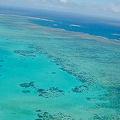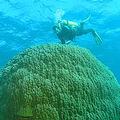 澳洲科學家在一份新發表的研究報告中表示,全球暖化使世界最大珊瑚礁棲地生長速度趨緩。
澳洲科學家在一份新發表的研究報告中表示,全球暖化使世界最大珊瑚礁棲地生長速度趨緩。
科學家指出,有強烈的證據顯示因為海水表面的溫度升高以及海洋酸化的雙重效應,使得世界珊瑚礁正逐漸減少,而這二種海洋現象都是因為氣候暖化的結果。
因為海洋吸收過多的溫室氣體二氧化碳,使其酸化,進而影響了珊瑚吸收海水中鈣質的速率,使他們無法鈣化骨骼形成珊瑚礁。
研究顯示,世界最大最健全的微孔珊瑚礁棲地-澳洲大堡礁(Great Barrier Reef),從1990年快速成長的「關鍵點」之後,其現在的成長速度減緩超過14%。
位於湯斯維爾(Townsville)的澳洲海洋科學研究所(Australian Institute of Marine Science, AIMS)其研究員所撰寫的研究報告,經評選刊載於今年1月2日由美國科學促進聯會(American Association for the Advancement of Science, AAAS)所出版的『科學』研究期刊。
此篇報告的主要作者之一珍妮絲.羅浮教授(Dr. Janice Lough)表示,「我們針對世界上保護最好而且管理最佳的珊瑚礁生態系統,從過去氣候變化相對溫和的時候即一直持續觀察到今天,我們發現這種變化非常明顯,而且令人擔憂。」
羅浮博士和另外二位主要作者狄亞斯(Glenn De'ath)博士和凱薩琳娜.法布利修斯(Katharina Fabricius)博士指出,他們所共同提出的這份報告可以說是目前對於大堡礁珊瑚鈣化速度研究最完整的研究報告。 
研究報告主筆狄亞斯博士說:「資料顯示珊瑚礁的鈣化速度突然大幅減少,這個情形非常嚴重而且是400年來前所未見的。」
他說,「致使珊瑚礁鈣化速度劇烈下降的原因不明,但是我們的研究顯示,溫度壓力上升以及海洋酸化的雙重效應可能是造成大堡礁珊瑚碳酸鈣沉澱能力減緩的主要原因。」
這份研究更加證明了全球氣候變遷已經嚴重影響了珊瑚礁系統。然而,透過國家公園的保護,這些珊瑚礁棲地將可望延著澳洲東北方的昆士蘭海岸延綿2600公里(1600哩)。
Global warming is slowing the growth of corals on the world's largest reef, Australian scientists have shown in a newly published study.
"Evidence is strong that the decline has been caused by a combination of rising sea surface temperatures and ocean acidification," say the scientists. Both phenomena are effects of a warming climate.
As oceans absorb more of the greenhouse gas carbon dioxide, they become more acidic, affecting the rate at which corals absorb calcium from seawater to build their hard skeletons.
The study shows that the biggest and most robust Porites corals on Australia's Great Barrier Reef have slowed their growth by more than 14 percent since the "tipping point" year of 1990.
Written by researchers from the Australian Institute of Marine Science, AIMS, in Townsville, the study is featured in the January 2 in the journal "Science," a publication of the American Association for the Advancement of Science.
"It is cause for extreme concern that such changes are already evident, with the relatively modest climate changes observed to date, in the world's best protected and managed coral reef ecosystem," said co-author Dr. Janice Lough.
Dr. Lough and co-authors Dr. Glenn De'ath and Dr. Katharina Fabricius say theirs is the most comprehensive study to date on calcification rates of Great Barrier Reef corals.
"The data suggest that this severe and sudden decline in calcification is unprecedented in at least 400 years," said Dr. De'ath, the study's principal author.
"The causes of this sharp decline remain unknown, but our study suggests that the combination of increasing temperature stress and ocean acidification may be diminishing the ability of Great Barrier Reef corals to deposit calcium carbonate," he said.
This research adds to the growing weight of evidence that global climate change is already affecting the reef system. Protected as a national park, the reef extends for 2,600 kilometers (1,600 miles) along the coast of Queensland in northeast Australia.





